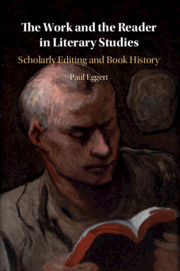Book contents
- The Work and the Reader in Literary Studies
- The Work and the Reader in Literary Studies
- Copyright page
- Dedication
- Contents
- Figures
- Preface
- Chapter 1 Introduction
- Chapter 2 Reviving the Work-Concept
- Chapter 3 The Digital Native Encounters the Printed Scholarly Edition Called Hamlet
- Chapter 4 The Reader-Oriented Scholarly Edition
- Chapter 5 Digital Editions
- Chapter 6 The Work, the Version and the Charles Harpur Critical Archive
- Chapter 7 Book History and Literary Study
- Chapter 8 Book History and Literary Study
- Chapter 9 Adaptation, Folklore and the Work
- Chapter 10 Conclusion
- Notes
- Bibliography
- Index
Chapter 8 - Book History and Literary Study
Joseph Conrad and D. H. Lawrence
Published online by Cambridge University Press: 19 August 2019
- The Work and the Reader in Literary Studies
- The Work and the Reader in Literary Studies
- Copyright page
- Dedication
- Contents
- Figures
- Preface
- Chapter 1 Introduction
- Chapter 2 Reviving the Work-Concept
- Chapter 3 The Digital Native Encounters the Printed Scholarly Edition Called Hamlet
- Chapter 4 The Reader-Oriented Scholarly Edition
- Chapter 5 Digital Editions
- Chapter 6 The Work, the Version and the Charles Harpur Critical Archive
- Chapter 7 Book History and Literary Study
- Chapter 8 Book History and Literary Study
- Chapter 9 Adaptation, Folklore and the Work
- Chapter 10 Conclusion
- Notes
- Bibliography
- Index
Summary
The works of Joseph Conrad (b. 1857) and D. H. Lawrence (b. 1885) came from deeper sources than Boldrewood’s (see Chapter 7) and are far more ambitious in scope and thematic concern. In such cases the biographical sources and initiating phases of the work’s existence generally repay intent study.
The tortured genesis and revision of Conrad’s Under Western Eyes (1911) is clarified by reference to MSS materials. The work–version relationship is put under productive stress, the implications for editing are pursued, and a book-historically informed avenue for literary study is demonstrated.
The marvellous new world of widespread literacy and the ready availability of print, complemented by the effects of the US Chace Act of 1891, the rise of literary agents and upmarket literary publishers such as Seltzer and Secker mediated the forms of Lawrence’s idiosyncratic writings. Since every act of writing presupposes a reading, even in Lawrence’s case, literary study needs to be informed by this conditioning context. The versionality of his writings uncovered by the Cambridge Works editors argues the need for a digital critical archive of his writings organised on a temporal principle.
Keywords
- Type
- Chapter
- Information
- The Work and the Reader in Literary StudiesScholarly Editing and Book History, pp. 131 - 154Publisher: Cambridge University PressPrint publication year: 2019

